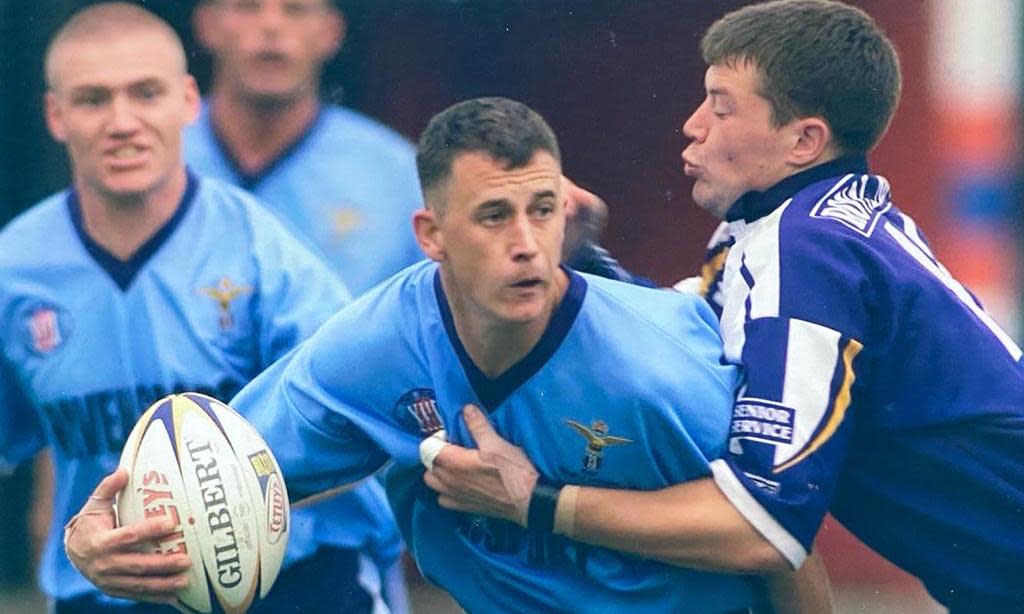
The standout tie in the opening round of this year’s Challenge Cup is perhaps an unusual one to casual rugby league observers, with the Royal Air Force taking on the Navy in an all-armed forces affair at RAF Cranwell. It is fitting, though, that such a fixture headlines the first round of 2024 given that this year is the 30th anniversary of the ban being lifted on forces personnel being allowed to even play the sport, let alone compete in its biggest competition.
The game on Saturday will be broadcast on the BBC but, had it not been for the efforts of men such as Squadron Leader Damian Clayton, it would not have been possible. Clayton joined the RAF in 1987 having played rugby league in Brighouse as a teenager, but arrived to find a blanket ban on rugby league across all armed forces.
Related: The schools where England’s rugby league and union players are made
“The Rugby Football League’s efforts to change that weren’t gaining much traction because a lot of the senior figures in the forces at that time were all from places that didn’t play rugby league,” he says. “The decision-makers simply said there was no need for it and no interest in rugby league.” But Clayton, alongside his military career, made it his mission to change that. He spent years pleading his case with the RAF but was frequently told he could play any iteration of rugby – except 13-a-side.
It led to him becoming instrumental in forming what were known as the “Blue Bombers”, an unofficial RAF rugby league side who played privately sanctioned games against orders at home and overseas in the early 1990s. “We had to borrow a kit and we played a community team called Oulton Raiders in our first game,” he recalls. “We had nobody qualified to coach us, and we’d play public sector teams, civil servants, the prison service, anyone. But we never gave up on our hope of getting the approval to play properly.”
Clayton joined forces with Martin Coyd, who was fighting the same battle in the Army to get rugby league green-lit, and in 1994 they got their message through to parliament following a presentation to northern MPs. And on 29 April 1994, the-then minister of state for armed forces, Jeremy Hanley, stood up in the Commons and declared what Clayton had dreamed of hearing for years: rugby league was finally allowed to be played in the armed forces.
The growth since that day has been incredible. UK Armed Forces Rugby League is now on the Rugby Football League’s community board and in 2000 forces teams were granted admission into the sport’s most prestigious competition, the Challenge Cup. Given that they have limited training time together and the players converge from all over the country, it is often a challenge competing against established community clubs but Clayton – who captained the RAF’s team until his retirement in 2006 and has taken them on tours of Russia and Australia, even playing in a curtain-raiser for State of Origin – is under no illusions about the importance of a continued forces presence.
“Sometimes we don’t compete; the top community clubs could beat forces teams easily on occasions,” he admits. “But it’s important to understand why we’re in the competition and what it means. That’s bigger than any scoreline. Everyone has a connection with the forces on some level and it’s broader than just playing rugby league. The link between the forces and rugby league goes right back to the sport’s formation. The RAF team is based at RAF Cranwell in Lincoln, the home of officer training. Where better to inform our future leaders that rugby league is a sport you can play with freedom and passion?”
Clayton’s efforts were rewarded with an MBE in 2002 for services to rugby league: the first serviceman to be given such an award for something other than services to the military. Now chief executive at Halifax Panthers, he is instrumental in the annual service at the Cenotaph each year on the eve of the Challenge Cup final, when rugby league pays its respects to the fallen heroes. He will watch on with pride on Saturday lunchtime as the RAF and the Navy do battle in front of a national audience.
“It’s number one of everything I’ve achieved,” he says. “On the back of that, the knock-on effect of getting recognised has enabled me to have huge personal development in other areas but more importantly, it’s given a whole generation of forces personnel opportunities to play this incredible sport. Hopefully both the RAF and the Navy exploit the opportunity.”
Article courtesy of
Source link